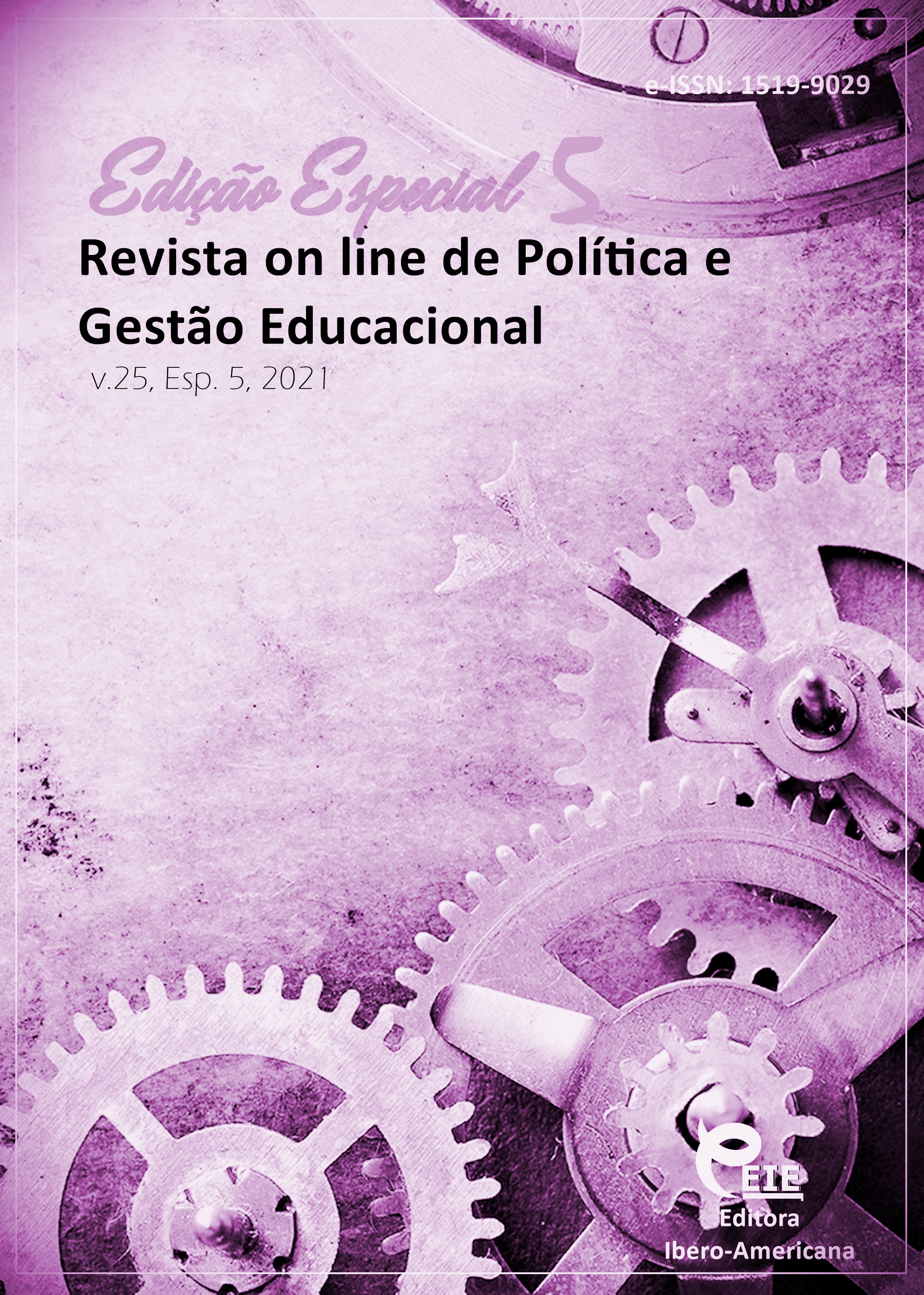Possibilidades de pesquisa científica na formação da criatividade de um futuro engenheiro
DOI:
https://doi.org/10.22633/rpge.v25iesp.5.16011Palavras-chave:
Criatividade, Educação em engenharia, ReflexãoResumo
O objetivo do artigo: determinar o potencial da pesquisa científica na formação profissional nacional e estrangeira na formação da criatividade de um futuro engenheiro. Métodos de investigação: análise teórica da literatura estrangeira e nacional, conversas, análise de questionários, experiência pessoal, avaliação e autoavaliação de licenciados, generalização e sistematização dos dados obtidos. Resultados da pesquisa: o artigo apresenta uma análise teórica e uma análise dos resultados da pesquisa, que permite: formular e revelar o conteúdo do conceito de “pesquisa científica”, para defini-lo como uma face significativa do futuro engenheiro; identificar mecanismos, modelos, princípios e regras e tipos de pesquisa científica etc. Conclusões: foram determinadas as possibilidades da pesquisa científica como meio de moldar a criatividade de um futuro engenheiro, comprovada a importância de sua posição motivacional e reflexiva no ensino de engenharia.
Downloads
Referências
BERNHARD, J. Learning Through Design-Implement Experiences: A Literature Review, in Work-in-progress. In: INTERNATIONAL CDIO CONFERENCE, 12., 2016, Turku. Proceedings […]. Turku, Finland: Turku University of Applied Sciences, 2016.
BODEN, M. A. Dimensions of creativity. Cambridge: MIT Press. 1994.
BOSMAN, L.; FERNHABER, S. Applying Authentic Learning Through Cultivation of the Entrepreneurial Mindset in the Engineering Classroom. Education Sciences, v. 1, n. 7. 2016.
BUGAKOVA, E. V.; MIROSHNIKOVA, D. V. Organization of creative interaction in professional self-determination of students. KANT, v. 2, n. 31, 28-32. 2019.
BULTSEVA, M. A.; LEBEDEVA, N. M. Intercultural contacts and creativity: analysis of foreign approaches. Modern foreign psychology, v. 4, 15-21. 2018.
CHEVILLE, R. A. Hidden constraints in the design of liberal studies in engineering. Eng. Studies, v. 7, 147-149. 2015. DOI: http://dx.doi.org/10.1080/19378629.2015.1062487
CRUZ, M. L.; SAUNDERS-SMITS, G. N.; GROEN, P. Evaluation of competency methods in engineering education: a systematic review. European Journal of Engineering Education, v. 45, n. 5, 729-757. 2019. DOI: https://doi.org/10.1080/03043797.2019.1671810
DUNNE, C. Can Intercultural Experiences Foster Creativity? The Relevance, Theory and Evidence. Journal of Intercultural Studies, v. 38, n. 2, 189-212. 2017.
GUILFORD, J. P. A Revised Structure of Intellect: Studies of aptitudes of high-level personnel. Los Angeles: The University of Southern California, 1957.
LIEBERMAN, Y. L. Research of creativity of first-year students of a technical university. Ped. education in Russia, v. 1, 128-136, 2015.
LUCAS, B.; HANSON, J. Thinking Like an Engineer: Using Engineering Habits of Mind and SignaturePedagogies to Redesign Engineering. IJEP, v. 6, n. 2, 4-13. 2016.
MARQUIS, A. Present Absence: Undergraduate Course Outlines and the Development of Student Creativity Across Disciplines. Teaching in Higher Education, v. 22, n. 2, p. 222-238, 2017: DOI: htts://doi/org/10.1080/13562517.2016.1237495
MCCANTS, A. E. C. The liberal studies curriculum as the basis for an engineering education. Eng. Studies, v. 7, p. 145-146, 2015. DOI: http://dx.doi.org/10.1080/19378629.2015.1105411
MIKHALEVA, E. S.; SAYFUTDINOVA, G. S. The inclusion of creative technologies in the educational activity of the future engineer. Austrian Journal of Humanities and Social Sciences, v. 3-4, n. 11, 17-22, 2021. DOI: htts://doi/org/1029013/AJH-21-3/4-17-22
MOROZ, V. V. Axiological foundations for the development of creativity of university students: author. diss. Dr. ped. sciences. Orenburg. 2015.
PLSEK, P. E. Creativity, innovation, and quality. Asqc: Milwaukee, Wi, 1997.
RAE, D.; MELTON, D. E. Developing an Entrepreneurial Mindset in US Engineering Education: an International View of the KEEN Project. The Journal of Engineering Entrepreneurship, v. 7, n. 3, 2017.
ROTENBERG, V. S. The way of a thought: How ideas immerge. New York: Publishing solutions. 2018.
ROZHIK A. Y. Creative Component of Engineering Thinking: Theoretical and Experimental Study. Bulletin of the South Ural State University. Ser. Education. Educational Sciences, v. 10, n. 2, p. 89-108, 2018. DOI: https://doi.org/10.14529/ped180212
STEGHÖFER, J. Teaching Agile: Addressing the Conflict Between Project Delivery and Application of Agile Methods. In: INTERNATIONAL CONFERENCE ON SOFTWARE ENGINEERING COMPANION, 38., 2016. Proceedings […]. 2016. p. 303-312
TORRANCE, E. P. Education and creative potential. Minneapolis: University of Minnesota Press, 1963.
TRANQUILLO, J. The T-Shaped Engineer. Journal of Engineering Education Transformations, v. 30, n. 4, p. 12-24, 2017.
WHEADON, J.; DUVAL-COUETIL, N. Elements of Entrepreneurially Minded Learning: KEEN White Paper. The Journal of Engineering Entrepreneurship, v. 7, p. 17-25, 2017.
YAKOVLEVA, T. Chelyabinsk hosted the XIV Forum of interregional cooperation between Russia and Kazakhstan. 2017. Disponível em: http://chel.mk.ru/articles/2017/11/15/chelyabinsk-prinyal-xiv-forum-mezhregionalnogo-sotrudnichestva-rossii-i-kazakhstana
ZAKHAROVA, O. A.; CHERKESOV, L. V.; AKISHIN, B. A. The phenomenon of engineering thinking and the role of modern technical education in the training of a world-class engineer. World of education - education in the world, v. 3, n. 62, p. 77-81, 2016.
Downloads
Publicado
Como Citar
Edição
Seção
Licença
Copyright (c) 2021 Revista on line de Política e Gestão Educacional

Este trabalho está licenciado sob uma licença Creative Commons Attribution-NonCommercial-ShareAlike 4.0 International License.
Manuscritos aceitos e publicados são de propriedade da Revista on line de Política e Gestão Educacional. É vedada a submissão integral ou parcial do manuscrito a qualquer outro periódico. A responsabilidade do conteúdo dos artigos é exclusiva dos autores. É vedada a tradução para outro idioma sem a autorização escrita do Editor ouvida a Comissão Editorial Científica.











